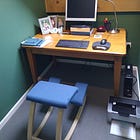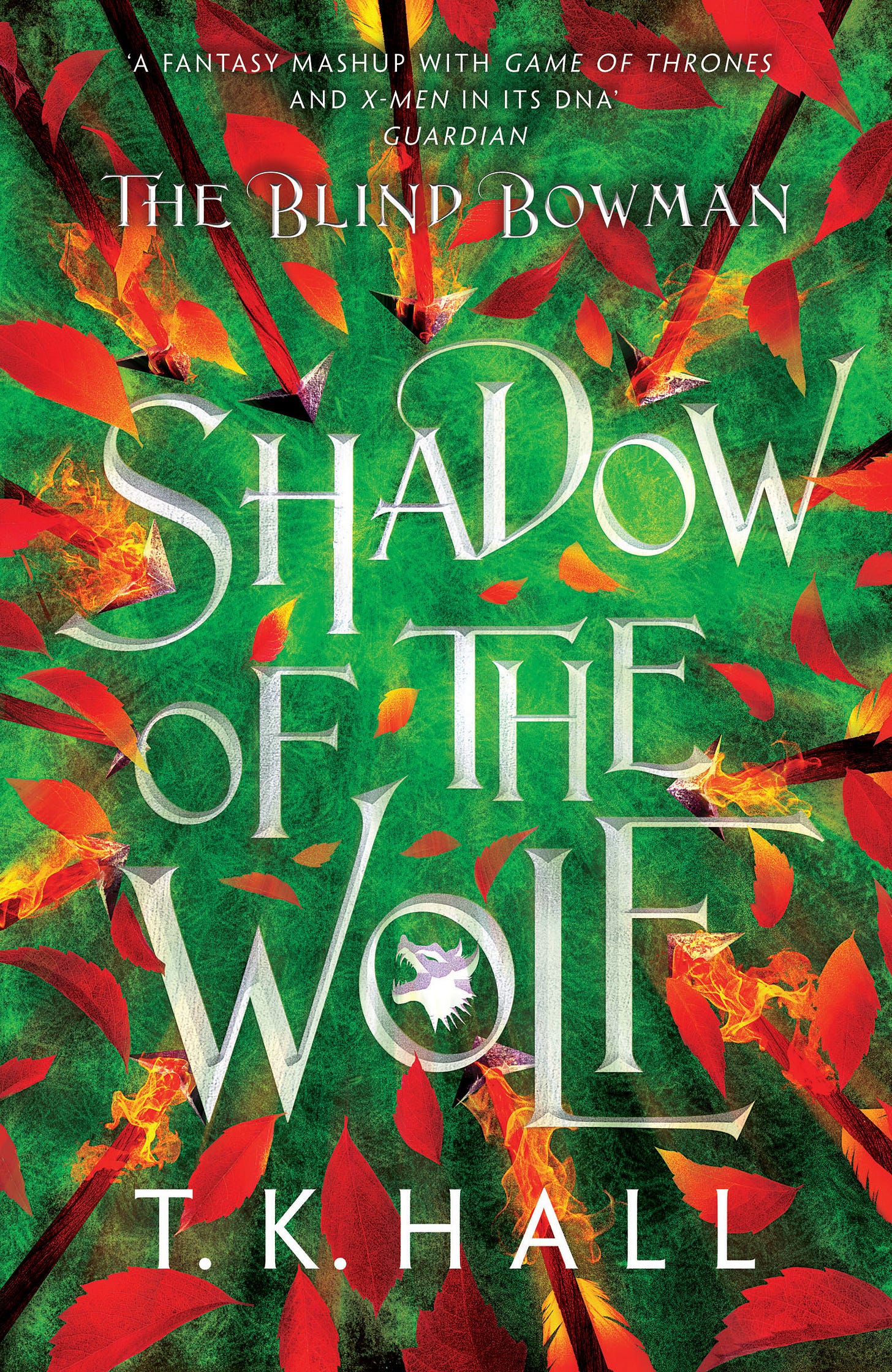To Write Freely, Write Freehand (Revisited)
A powerful practice for greater creativity
Note: This was one of my earliest posts on Substack, and as such it only went out to a handful of subscribers. Those who it did reach apparently found it useful, so I’m republishing it today for a wider audience. Also, I recently recorded an interview on this theme with writer and philosopher
- listen/watch here. Enjoy!In the course of writing three novels, there’s one practice I’ve found to be invaluable. In fact, it’s been transformative, not only boosting the quality and consistency of my writing, but also helping to put the joy back into my storytelling.
It’s a simple enough practice. Even so, I didn’t get there without a fight.
At the time, I was failing miserably to complete my second novel, Dark Fire. Ensnared in creative fear, I was endlessly planning and plotting, trying to think my way through the story. When I did manage to get words onto screen I immediately judged them not good enough and reached for the backspace.
And so it went. For months. Then years.
Breaking point was messy, and forms part of a longer story. Suffice to say, I finally admitted I couldn’t go on this way. Either I found a radically different approach to this work, or I would have to stop writing altogether.
The second option was scarier than the first. So I set about overhauling every aspect of my creative process. This went deep, reaching into the very foundations of my lifestyle, my habits, and my outlook.
But one seemingly small change had a more profound effect than any other.
I turned off my computer, and started writing first drafts with pencil and paper.
Put like that it sounds like a simple transition. But like all habit changes, it threw up a great deal of resistance.
For months beforehand, I had the nagging suspicion that I should try writing freehand. Perhaps part of me was remembering my schooldays, scribbling stories for fun. Or my travels in South America – filling journal after journal, fervently recounting vivid experience.
But some rebel part of me didn’t want to listen. What did it matter how I wrote my fiction – getting the words down was all that mattered. Surely the only difference is that a word processor is quicker. Words written longhand need to be transcribed later. My novel was already years behind schedule – could I really afford this extra layer of time-consuming labour?
And so I waged this new inner war. I wrote a scene with pencil and paper and it seemed to offer something different and exciting – then got frustrated when I had to go back to type it up. Shouldn’t I be building momentum by drafting the next bit straight onto screen? I went back and forth, one day thrilled by the freedom of freehand – the next retreating to old habits, and the seeming efficiency of the machine.
I sought allies for this fight, trawling articles in books and online, collecting testimonies from dozens of writers who swear by writing freehand.
“I love walking into my office with no electronics, no distractions. Just slippers on my feet, tea on the desk, and a story in my fingers.” Newbery Medal winner Kelly Barnhill
“Writing longhand let my hand and my brain breathe a little easier…I felt more connected to the words I was writing…more present in ever sense.” Steve Brezenoff, author of the Ravens Pass series
“More and more, I find myself turning all the way on only when the machines are turned off.” Novelist and short story writer Joe Hill
Finally, faced with this onslaught, the rebel part of me surrendered. I finally and fully admitted that writing freehand drafts is the superior method.
Because make no mistake, there is a difference. For any writers out there who habitually write on computer, I urge you to try it. Picking up a pen or pencil, you immediately feel less encumbered. Making marks on paper is freeing, more joyful, and ultimately more productive.
Some of this is explicable. Whatever you put on paper stays on paper. Even if you reject a word, or a sentence, and immediately put a line through it, the text still exists. You can see your working underneath. There is something wonderfully organic about this. All those crossed out words and annotations and sketches become part of the process – part of the evolution of the story you're trying to tell. They are signposts leading you to future, better drafts; they give you a sense you are getting somewhere, no matter how rocky and winding the path.
A word processor is more clinical, more cynical, and more cutthroat. It obliterates marks of progress and obscures the road travelled. If you’re not careful, in a fit of pique, you can delete whole paragraphs. And when they’re gone they leave behind only a white screen.
This matters not because they were good words, necessarily, but because they were scaffolding. And now that scaffolding has been pulled down. It’s the difference between making a mistake and learning from it, and making that mistake and wiping it from your memory, dooming you to repeat the same error again and again.
There are days, writing with pencil and paper, when my pages are a mess of deletions and annotations and notes in the margins. But somehow that’s okay. I take one last look at what I’ve produced, and know it was necessary – that this chaos of scribbles is a sign that something is taking shape. Walking away from a blank screen is infinitely more dispiriting.

But there are deeper, more potent reasons for drafting freehand. They stray towards the mystical. Stories summon themselves from the deep psyche, or seep out of the Earth, or emerge from the collective consciousness. The storyteller is merely the conduit, trying to divine these stories and give them written form. The reader receives the words in turn, and does the hard imaginative work of turning them into breathing characters and living worlds.
These channels of transmission are easily blocked. Some blockages (an open web page; fear) are fatal. They clog the arteries and stop the story’s heart.
But anything placed between the author and the page, or the reader and the words, can stem the flow. A computer (even one that’s disconnected from the internet) is one such impediment. The screen with its backlit glaring stare, daring you to fail. Word processing software, with its blinking impatient cursor, its scalding squiggles of faulty grammar. All this stands sentry between you and the story you need to tell.
Picking up a pencil, making your mark, feels so much more direct. The distance closes, somehow, between the story forming in your mind’s eye, and the words appearing in black and white. As your hand sweeps across the page (rather than jerking staccato across the keys), it is that much easier to lose yourself in your story world.
I was concerned that writing freehand would cause more delay. But even that turned out to be groundless. Something about writing with pencil and paper encourages you to keep moving forwards. So even if you do write more slowly, you end up making steadier progress.
At least, it certainly worked that way for me. My difficult second novel, Dark Fire, is now finished and out in the world. I’ve also completed a third book, Wildwood Rising, which will be published in May next year. This creative recovery relied on my changing a great many habits. But none were more powerful than drafting freehand.
How about you? Do you write best on computer, or with pen and paper? Let us know in the comments, or send me a message.
Thanks for being here – and happy writing!
Tim
P.S. If you enjoyed this article, here’s a sequel of sorts:
P.P.S. Here at Wildwood Rising, I intend to share all the practices that unlocked my storytelling and helped my writing flourish. I’ll be creating a growing library of resources, including meditations, rituals and reflections, all intended to feed the creative mind. Sign up to make sure you receive it all direct to your inbox!
P.P.P.S. Don’t forget to check out the start of the Blind Bowman trilogy, Shadow of the Wolf, which SFX Magazine called “wild, weird and wonderful,” and bestselling author Sally Green pronounced her “favourite book of the year.”





Hmmm...maybe I should do this. I started out writing stories with pencil and notebook paper in elementary school before I got my computer.
Hi there, and thanks. Like the article.